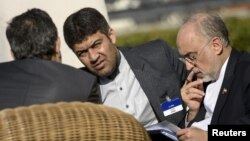Senior diplomats from several of the so-called P5+1 nations dealing with Iran's controversial nuclear ambitions are arriving in Lausanne Saturday where U.S. Secretary of State John Kerry and Iranian Foreign Minister Mohammad Javad Zarif have been meeting for talks aimed at reaching a framework deal by Tuesday's deadline.
Zarif, speaking on the sidelines of talks Friday said the negotiations have been "very difficult and very complicated."
A U.S. State Department official said the negotiations have been "tough and very serious."
The official also said the move by Iranian President Hassan Rouhani to reach out to the leaders of six world powers on Thursday is "hopefully a sign that Iran is ready to make some of the tough decisions" it needs as part of the agreement.
Rouhani sent a letter to the P5+1 nations participating in the talks "explaining Iran's position on nuclear issues and latest developments" in the negotiations.
Both Kerry and Zarif have expressed optimism a deal can be reached.
U.S. President Barack Obama spoke on Friday with German Chancellor Angela Merkel on the nuclear negotiations. The White House said the two leaders "reaffirmed their commitment to achieving a long-term comprehensive deal that fully and verifiably ensures that Iran's nuclear program is exclusively peaceful going forward, while noting that Iran must make the decisions necessary to resolve several remaining issues."
Iran wants international sanctions against it immediately dropped as part of a nuclear deal, while the U.S. and others say the sanctions should be lifted gradually. There is also disagreement over other issues, including the amount and quality of enriched uranium that Iran would be able to develop.
Iran and the P5+1 partners - the U.S., Britain, China, France, Russia and Germany - have said it is crucial to reach a framework deal before March 31, but the hard deadline for a deal is the end of June.











